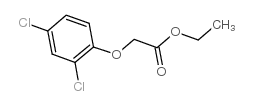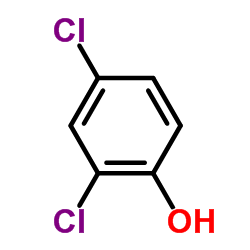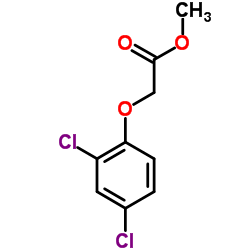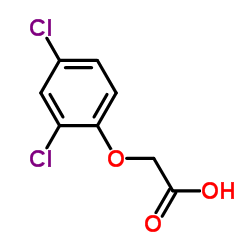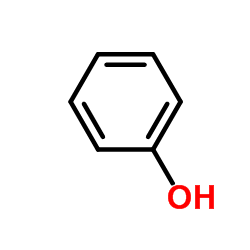2,4-Dichlorophenoxyacetic acid hydrazide
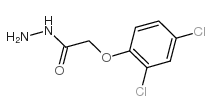
2,4-Dichlorophenoxyacetic acid hydrazide structure
|
Common Name | 2,4-Dichlorophenoxyacetic acid hydrazide | ||
|---|---|---|---|---|
| CAS Number | 28236-62-6 | Molecular Weight | 235.06700 | |
| Density | 1.438g/cm3 | Boiling Point | 448.8ºC at 760mmHg | |
| Molecular Formula | C8H8Cl2N2O2 | Melting Point | 153-157 °C | |
| MSDS | N/A | Flash Point | 225.2ºC | |
| Name | 2-(2,4-dichlorophenoxy)acetohydrazide |
|---|---|
| Synonym | More Synonyms |
| Density | 1.438g/cm3 |
|---|---|
| Boiling Point | 448.8ºC at 760mmHg |
| Melting Point | 153-157 °C |
| Molecular Formula | C8H8Cl2N2O2 |
| Molecular Weight | 235.06700 |
| Flash Point | 225.2ºC |
| Exact Mass | 233.99600 |
| PSA | 64.35000 |
| LogP | 2.45330 |
| Vapour Pressure | 3E-08mmHg at 25°C |
| Index of Refraction | 1.581 |
Synonym: Section 2 - COMPOSITION, INFORMATION ON INGREDIENTS
Risk Phrases: 36/37/38 Section 3 - HAZARDS IDENTIFICATION EMERGENCY OVERVIEW
Irritating to eyes, respiratory system and skin. Potential Health Effects Eye: Causes eye irritation. Skin: Causes skin irritation. May be harmful if absorbed through the skin. Ingestion: May cause irritation of the digestive tract. May be harmful if swallowed. Inhalation: Causes respiratory tract irritation. May be harmful if inhaled. Chronic: Not available. Section 4 - FIRST AID MEASURES Eyes: Flush eyes with plenty of water for at least 15 minutes, occasionally lifting the upper and lower eyelids. Get medical aid. Skin: Get medical aid. Flush skin with plenty of water for at least 15 minutes while removing contaminated clothing and shoes. Ingestion: Get medical aid. Wash mouth out with water. Inhalation: Remove from exposure and move to fresh air immediately. If not breathing, give artificial respiration. If breathing is difficult, give oxygen. Get medical aid. Notes to Physician: Treat symptomatically and supportively. Section 5 - FIRE FIGHTING MEASURES General Information: As in any fire, wear a self-contained breathing apparatus in pressure-demand, MSHA/NIOSH (approved or equivalent), and full protective gear. Extinguishing Media: Use water spray, dry chemical, carbon dioxide, or chemical foam. Section 6 - ACCIDENTAL RELEASE MEASURES General Information: Use proper personal protective equipment as indicated in Section 8. Spills/Leaks: Vacuum or sweep up material and place into a suitable disposal container. Section 7 - HANDLING and STORAGE Handling: Avoid breathing dust, vapor, mist, or gas. Avoid contact with skin and eyes. Storage: Store in a cool, dry place. Store in a tightly closed container. Section 8 - EXPOSURE CONTROLS, PERSONAL PROTECTION Engineering Controls: Facilities storing or utilizing this material should be equipped with an eyewash facility and a safety shower. Use adequate ventilation to keep airborne concentrations low. Exposure Limits CAS# 28236-62-6: Personal Protective Equipment Eyes: Not available. Skin: Wear appropriate protective gloves to prevent skin exposure. Clothing: Wear appropriate protective clothing to prevent skin exposure. Respirators: Follow the OSHA respirator regulations found in 29 CFR 1910.134 or European Standard EN 149. Use a NIOSH/MSHA or European Standard EN 149 approved respirator if exposure limits are exceeded or if irritation or other symptoms are experienced. Section 9 - PHYSICAL AND CHEMICAL PROPERTIES Physical State: Crystalline powder Color: light beige Odor: Not available. pH: Not available. Vapor Pressure: Not available. Viscosity: Not available. Boiling Point: Not available. Freezing/Melting Point: 153 - 157 deg C Autoignition Temperature: Not available. Flash Point: Not available. Explosion Limits, lower: Not available. Explosion Limits, upper: Not available. Decomposition Temperature: Solubility in water: Insoluble. Specific Gravity/Density: Molecular Formula: C8H8Cl2N2O2 Molecular Weight: 235.07 Section 10 - STABILITY AND REACTIVITY Chemical Stability: Not available. Conditions to Avoid: Incompatible materials. Incompatibilities with Other Materials: Strong oxidizing agents. Hazardous Decomposition Products: Hydrogen chloride, nitrogen oxides, carbon monoxide, carbon dioxide. Hazardous Polymerization: Has not been reported Section 11 - TOXICOLOGICAL INFORMATION RTECS#: CAS# 28236-62-6 unlisted. LD50/LC50: Not available. Carcinogenicity: 2,4-Dichlorophenoxyacetic acid hydrazide - Not listed by ACGIH, IARC, or NTP. Section 12 - ECOLOGICAL INFORMATION Section 13 - DISPOSAL CONSIDERATIONS Dispose of in a manner consistent with federal, state, and local regulations. Section 14 - TRANSPORT INFORMATION IATA Not regulated as a hazardous material. IMO Not regulated as a hazardous material. RID/ADR Not regulated as a hazardous material. Section 15 - REGULATORY INFORMATION European/International Regulations European Labeling in Accordance with EC Directives Hazard Symbols: XI Risk Phrases: R 36/37/38 Irritating to eyes, respiratory system and skin. Safety Phrases: S 26 In case of contact with eyes, rinse immediately with plenty of water and seek medical advice. S 37/39 Wear suitable gloves and eye/face protection. WGK (Water Danger/Protection) CAS# 28236-62-6: No information available. Canada None of the chemicals in this product are listed on the DSL/NDSL list. CAS# 28236-62-6 is not listed on Canada's Ingredient Disclosure List. US FEDERAL TSCA CAS# 28236-62-6 is not listed on the TSCA inventory. It is for research and development use only. SECTION 16 - ADDITIONAL INFORMATION N/A |
| Hazard Codes | Xn;Xi |
|---|---|
| Risk Phrases | R36/37/38 |
| Safety Phrases | S37/39-S26 |
| HS Code | 2928000090 |
|
~96% 
2,4-Dichlorophe... CAS#:28236-62-6 |
| Literature: Maingot, Lucie; Elbakali, Jamal; Dumont, Julie; Bosc, Damien; Cousaert, Nicolas; Urban, Agathe; Deglane, Gaelle; Villoutreix, Bruno; Nagase, Hideaki; Sperandio, Olivier; Leroux, Florence; Deprez, Benoit; Deprez-Poulain, Rebecca European Journal of Medicinal Chemistry, 2013 , vol. 69, p. 244 - 261 |
|
~% 
2,4-Dichlorophe... CAS#:28236-62-6 |
| Literature: Holla, B. Shivarama; Kalluraya, Balakrishna; Nath, S. C. Journal fuer Praktische Chemie (Leipzig), 1988 , vol. 330, # 4 p. 549 - 557 |
|
~% 
2,4-Dichlorophe... CAS#:28236-62-6 |
| Literature: Wei, Tai-Bao; Liu, Hong; Li, Man-Lin; Zhang, You-Ming Journal of Chemical Research, 2005 , # 7 p. 432 - 433 |
|
~% 
2,4-Dichlorophe... CAS#:28236-62-6 |
| Literature: Karthikeyan, Mari Sithambaram; Holla, Bantwal Shivarama; Kumari, Nalilu Suchetha European Journal of Medicinal Chemistry, 2007 , vol. 42, # 1 p. 30 - 36 |
|
~% 
2,4-Dichlorophe... CAS#:28236-62-6 |
| Literature: Bade, Steffen; Roeckendorf, Niels; Franek, Milan; Gorris, Hans H.; Lindner, Buko; Olivier, Verena; Schaper, Klaus-Juergen; Frey, Andreas Analytical Chemistry, 2009 , vol. 81, # 23 p. 9695 - 9702 |
|
~% 
2,4-Dichlorophe... CAS#:28236-62-6 |
| Literature: Lokanath; Sridhar; Shashidhara Prasad; Nagaraja; Mohan Rao Acta Crystallographica Section C: Crystal Structure Communications, 1998 , vol. 54, # 5 p. 669 - 670 |
| HS Code | 2928000090 |
|---|---|
| Summary | 2928000090 other organic derivatives of hydrazine or of hydroxylamine VAT:17.0% Tax rebate rate:9.0% Supervision conditions:none MFN tariff:6.5% General tariff:20.0% |
| 2,4,6-PIPERIDINETRIONE SODIUM SALT |
| 2,4-DICHLOROPHENOXYACETIC ACID HYDRAZIDE |
| 2,4diClPhOAcN2 |
| MFCD00051972 |
| 2,4-dichlorophenoxyacetyl-hydrazine |
| o,p-dichloro phenoxyacetic acid hydrazide |
